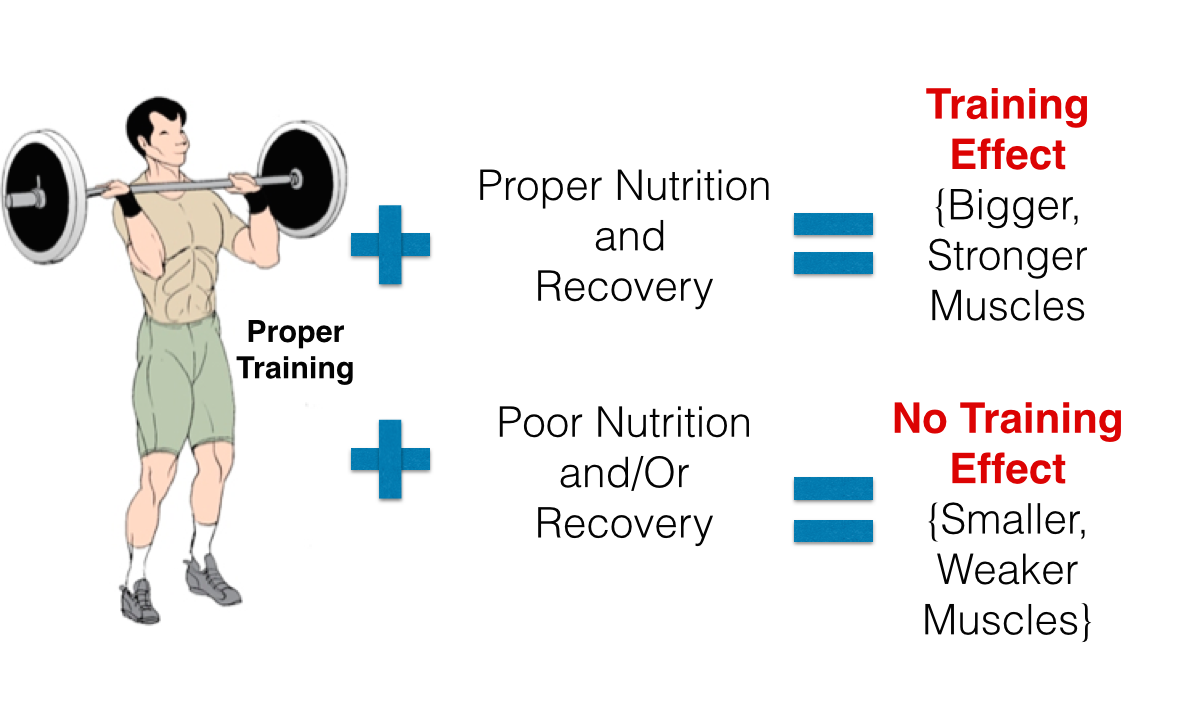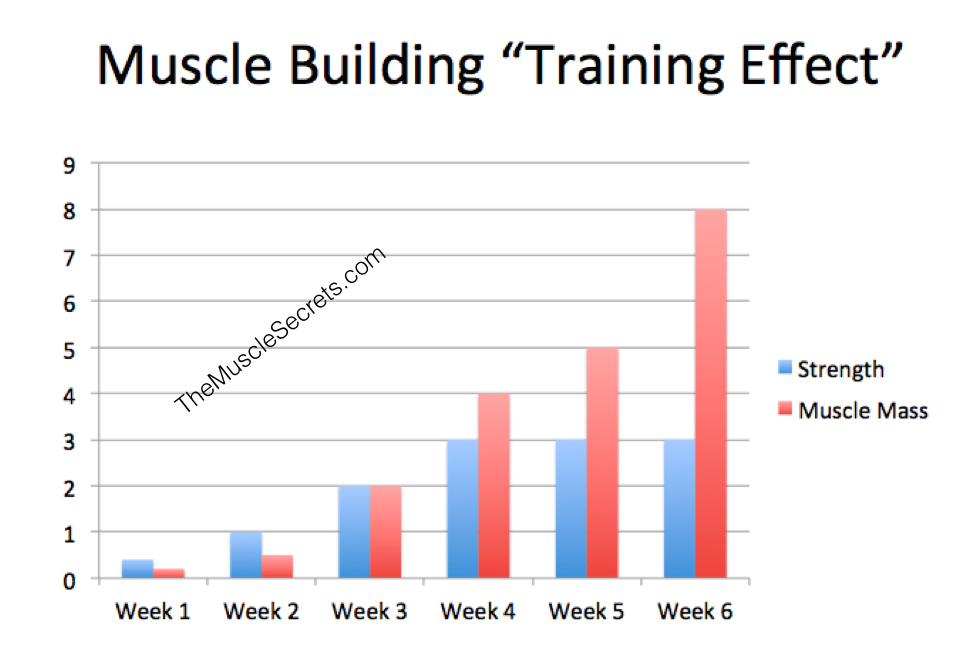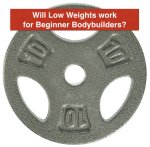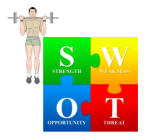How to Use the Amazing Muscle Building Principle called "The Training Effect"
Will your awesome workout bring you muscle gains? Well that depends on the muscle building principle called, The Training Effect. Find how it works and how to use it for killer muscle gains every 4 to 6 weeks.
 The Training Effect Principle of Muscle Building!
The Training Effect Principle of Muscle Building!Imagine this scenario.
You hit the gym hard working every set to failure.
3…2…1… you pound those last few reps. You sweat like hell, your body is burning and by the end of the workout you feel totally smashed.
You have trained. No doubt about it. But does that guarantee muscle gains? Have you produced the training effect? Not Yet!
To gain muscle mass you need repair the damages muscles, build new muscle proteins, recuperate your brain enough and train for at least 4-6 weeks consistently. The Training effect concept explains this process well.
Inside this Muscle building Training Effect Article:
- What is The Training Effect principle
- Why it takes 4 - 6 weeks for training effect to kick in
- How to use training effect for maximum muscle gains
- When to move on to next program
What is the Training Effect Principle
"Training effect is the effect that hard training in the gym should bring".
In our case the training effect should bring muscle and strength gains.
As you already know that It is the things you do after training that will have the biggest impact on your results.
Two facts about bodybuilding:
1. In the gym: You actually damage {cause micro trauma} your muscles when you workout
2. On the Dining table: You repair your muscles and add new proteins when not working out
Anabolism and Catabolism:
Gaining muscle is a balance between protein synthesis and protein breakdown.
Anabolism results when you provide high quality nutrients at proper timing and give enough time for brain/muscles to recover from previous workout.
Protein Synthesis > Protein Breakdown = Muscle Gain
Catabolism results if your fail to provide enough quality nutrients and/or fail to recover your muscles/brain.
Protein Breakdown > Protein Synthesis = Muscle Loss
Although you should see muscle and strength gains every week, the most noticeable changes in muscle mass takes place between weeks 4 to 6, called training effect and is explained by the graph below.
The 6 Week Training Effect principle also reveals how to peak your gains every 4 -6 weeks and make noticeable muscle gains faster.
The SIX Week Training Effect Process

Your First 3 weeks {Weeks 1 to 3}
Have you wondered why muscle mass eludes you in first few weeks while your lifts get bigger?
It is because for first 3 weeks your strength gains will supersede hypertrophy gains.
Guess what happens when you start a new program/workout or even an exercise? Your brain increases neural efficiency{nerves firing} to do the lifts.
And research has proven that the gains in first 2-3 weeks of any training program are mostly Neural without much muscle gain. {1}
As you can see in the graph, in the first 2 weeks, strength {blue bar} grows faster than muscle {red bar}.
By week 3, both strength and muscle gains are equal.
Your body tries its best to perform the lifts without increasing any muscle mass {no hypertrophy}.
It fires more neurons, makes them fire more efficiently, and even co-ordinates muscles better to do the lifts. Why?
Because improved brain firing is the first response to intense training.
You see, your body can get strong only by two ways:
- increase neural efficiency or
- cause muscle hypertrophy.
And muscle hypertrophy is costly. In the muscle homeostasis lesson you learnt that it wants to conserve energy, hence the delay in muscle gains over neural gains.
Next Three Weeks {Weeks 4 to 6}
But if you are progressive in your training, your body increases protein synthesis, reduces protein breakdown and finally give up and adds more muscles. {2}
Come week 4-6, muscle gains overtake strength gains showing that muscle growth is geometric and not linear.
Your body will be forced to makes such gains IF
- Your progressively overload muscles and
- nutrition and recovery are taken care of.
You need to progressively increase poundages {incremental of course} and eat high caloric, nutrient dense foods and recover well to see the 4 - 6 week fast muscle gains.
But If your nutrition is not in order, you actually grow weak. It makes sense right?
Training causes muscle damage and muscle repair requires proteins, carbohydrates and high quality fats. It also needs water and micronutrients like minerals/vitamins.
Provide them in the right order and you will gain muscle. Fail to provide them then where are the raw materials for repair and growth?
P.S. How musch muscle gain is possible depends on age, sex, genetic background, training experience and other factors. But everyone regardless of age can see dramatic muscle gains with optimal training and nutrition. {3}
SIDEBAR: 6 Week Muscle Training Continuum
But why does it take 4-6 weeks for actual muscle growth
Because in addition to above, building of muscle proteins that will be added to the muscle takes time. There is some DNA signaling that has to take place, hormonal effect to kick in and satellite cells to be incorporated into muscle fibers. Your can read more in How muscle grows section.
But suffice it is to say: Stick like glue to your training/Nutrition program for 6 weeks and your results will peak to the max.
How to Make use of The Training Effect for Muscle Gains
Think of building muscle as breaking a big tree with an axe.
It cannot be done in one strike. But make multiple strikes, and the tree comes down.
Similarly your muscles are resistant to grow initially but if you train consistently for 4-6 weeks, they will grow and the tree will fall.
To maximize your muscle building results over 6 weeks you need to:
- Select High threshold muscle building exercises to target type II fibers
- Train with at least 70% intensity and high volume with at least 30-40 reps per exercise AND
- Fuel your muscles with first class proteins and quality supplements
- And most importantly - Don't give up for 6 weeks. You just put your head down and work without expecting fast gains until you get over the 6 week line.
Muscle Pump during workouts might make you feel like you have gained muscle, but they mislead. Its just blood flowing through your body.
But for real muscles, you need 4 to 6 straight weeks.
P.S. Make sure you take photos every 6 weeks before you begin and after you end a training program. They are the best way to guage progress in addition to measuring your weight. its easy to miss changes sometimes.
When to move on to Next Program and see consistent results
Its scientifically proven that in 4-6 weeks, your body gets used to the program and you enter diminishing returns. The more you do same workouts, the lesser you gains.
That means, the more you put in, the less results you get, going to the point of no returns! Sad but true.
But don't despair. Change a few variables in the program and you see another spurt in growth. And since you will be giving 4-6 months time for muscle transformation, 3-4 such cycles will get you there.
Referances:
1. Mulligan, SE, Fleck, SJ, Gordon, SE, and Koziris, LP. Influence of resistance exercise volume on serum growth hormone and cortisol concentrations in women. J Strength Cond Res 10: 256–262, 1996. Full Article pdf.
2. Tesch, PA. Skeletal muscle adaptations consequent to long-term
heavy resistance exercise. Med Sci Sport Exerc 20(5 Suppl.):
S132–S134, 1988.
3. Kraemer, WJ, Ha ̈kkinen, K, Newton, RU, Nindl, BC, Volek, JS, McCormick, M, Gotshalk, LA, Gordon, SE, Fleck, SJ, Campbell, WW, Putukian, M, and Evans, WJ. Effects of heavy-resistance training on hormonal response patterns in younger vs. older men. J Appl Physiol 87: 982–992, 1999.
Recent Articles
-
Bodybuilding Workouts & Muscle Building Workout Routines that Build Muscle
Jul 01, 17 09:52 AM
Discover effective bodybuilding workouts and muscle building routines with strategies to make every workout a killer one. Download free 3-day, 4-day or 5-day workout routines. -
Why Beginner Bodybuilders must use Light Weights for Muscle Gain
Jul 01, 17 09:44 AM
Discover the science why beginner bodybuilders must use light to moderate weights to gain maximum muscle mass in the first 2-3 months of training to gain muscle, prevent injuries and grow bigger. -
How to do a S.W.O.T Analysis of Your Bodybuilding Workout
Oct 26, 16 01:41 AM
Looking to take your bodybuilding workout to the next level? Then do a SWOT analysis of your muscle building workout to increase your lifts every workout.




